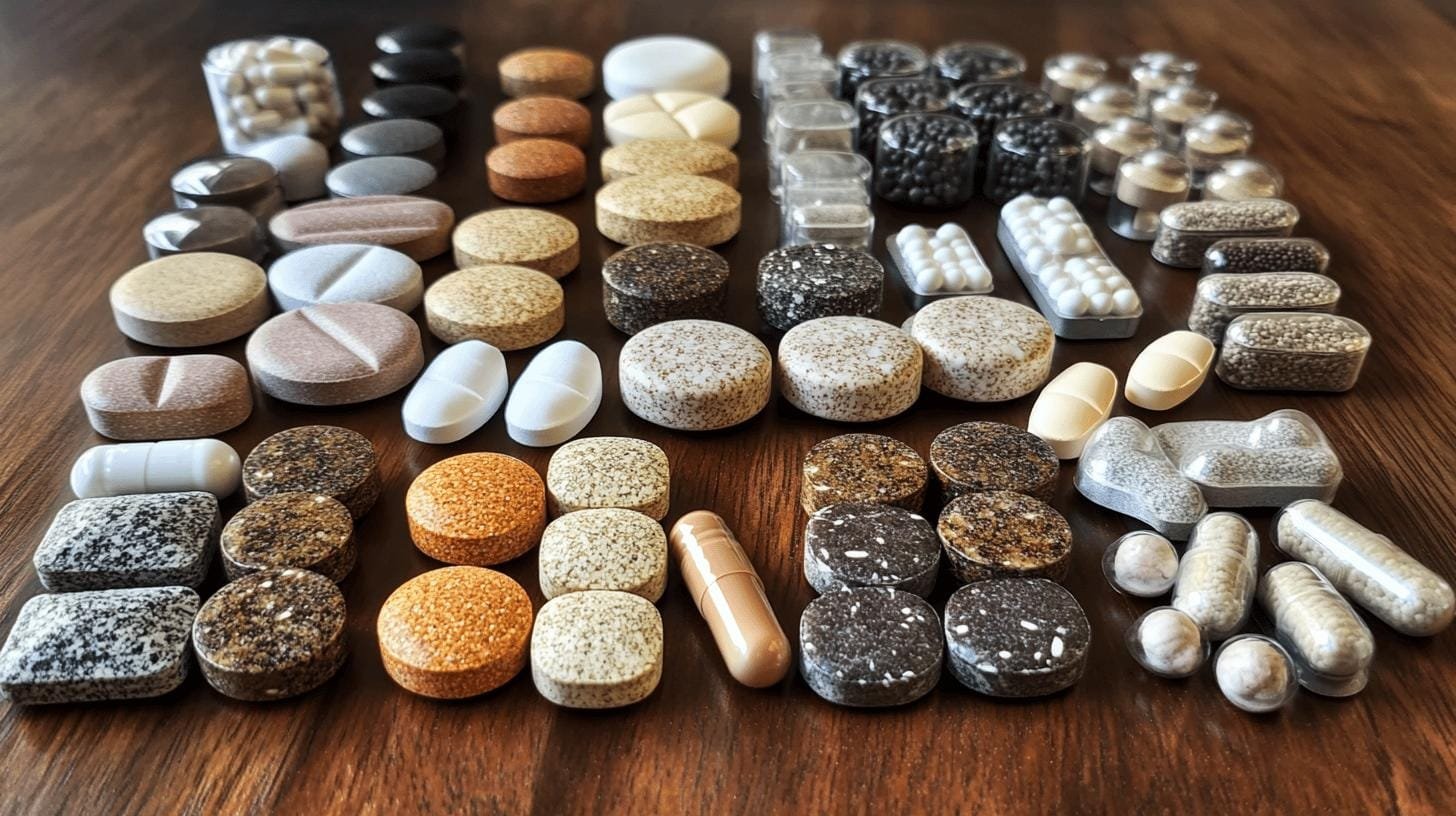Is coffee the only way to get that much-needed jolt of energy? Think again. From the lush rainforests of South America to the tranquil gardens of Japan, natural caffeine sources offer invigorating alternatives. For those seeking a gentler yet effective energy boost, options like yerba mate, yaupon tea, and matcha tea hold the key. These alternative caffeine sources provide a balanced energy uplift, coupled with unique health benefits that coffee simply cannot match. This article explores these natural wonders, offering insights into their benefits for a revitalized and health-conscious lifestyle.
Exploring Natural Sources of Caffeine
Natural sources of caffeine like yerba mate, yaupon tea, and matcha tea can boost energy without the downsides of regular coffee. These drinks offer a unique set of benefits.
Yerba mate is a favorite in South America, providing 80 to 175 mg of caffeine per cup. It’s packed with antioxidant polyphenols. Yaupon tea, native to the U.S., gives you 60 mg of caffeine per cup. It includes theobromine, which ensures energy lasts longer. Matcha tea, made from finely ground green tea leaves, offers 40 to 175 mg of caffeine per cup. It also contains theanine and catechins, which have soothing effects.
Benefits of Natural Caffeine Sources
- Yerba mate: Boosts energy and offers antioxidant benefits.
- Yaupon tea: Provides sustained energy and enhances blood flow.
- Matcha tea: Offers steady energy and improves mental focus.
- Antioxidants: Support health by fighting free radicals.
- Overall health: May boost cognitive function and reduce disease risk.
Compared to coffee, these natural alternative caffeine sources give a steady energy boost without the jitters or crashes linked to high caffeine. Yerba mate, yaupon tea, and matcha deliver balanced caffeine along with antioxidants. This makes them ideal for people who want natural energy and fewer caffeine side effects.
Caffeine-Free Alternatives for Energy Boost

If you prefer energy sans caffeine, try golden milk, rooibos tea, or coconut water. Golden milk combines turmeric, milk, and spices, offering both energy and anti-inflammatory benefits. Rooibos tea, from South Africa, is loaded with antioxidants and naturally boosts energy. Coconut water is refreshing and hydrates well, thanks to its mineral content.
Benefits of Caffeine-Free Alternatives
- Golden milk: Anti-inflammatory effects.
- Rooibos tea: High in antioxidants.
- Coconut water: Hydration and heart health support.
- Daily routine: Easy to include in meals or snacks.
You can easily fit these options into your routine. Enjoy golden milk as a comforting evening drink with warm spices. Drink rooibos tea hot or cold throughout the day. Coconut water can substitute sugary sports drinks after workouts, thanks to its electrolytes. These alternatives boost energy and promote a balanced lifestyle.
Chicory Coffee: A Popular Caffeine Substitute
Chicory coffee offers a caffeine-free alternative crafted from the roasted root of the Chicorium Intybus plant. It mimics regular coffee’s taste but lacks caffeine. The chicory root is roasted and ground to brew like traditional coffee. This drink is rich in inulin, a fiber that aids digestion and might reduce inflammation.
| Benefit |
Description |
| No Caffeine |
Enjoy a coffee-like experience without caffeine. |
| Inulin |
Supports digestion with prebiotic fibers. |
| Anti-inflammatory |
May reduce body inflammation. |
Some may experience digestive discomfort due to inulin in chicory coffee. Those wanting caffeine could find it lacking as a stimulant. Despite this, it suits people wanting to cut caffeine while keeping the coffee ritual. Chicory coffee stands out for promoting digestive health and a caffeine-free lifestyle.
Supplements as Alternative Caffeine Sources

Supplements can energize without involving traditional caffeine sources. They target energy, focus, and vitality. Rhodiola, maca, and vitamin B12 are gaining popularity for their natural energy benefits.
- Rhodiola: Reduces fatigue and boosts mental performance, ideal for stress.
- Maca: An adaptogen aiding focus, fighting fatigue, and boosting endurance.
- Vitamin B12: Critical for energy conversion, supporting cellular metabolism.
Using supplements safely involves correct dosages and awareness of possible interactions. Rhodiola is taken in capsules, 200 to 600 mg/day. Maca comes in powder or capsules, 1.5 to 3 grams/day. Vitamin B12 is often taken as a supplement, typically 2.4 micrograms/day, but may vary for deficiencies. Consult healthcare professionals to ensure safe use and optimize energy and focus.
Non-Caffeine Stimulants for Focus and Energy
Non-caffeine stimulants boost focus and energy without caffeine’s drawbacks. Peppermint tea may enhance exercise and boost brain oxygen levels. Ginseng, used for centuries, aids memory, endurance, and focus. Nuts provide long-lasting energy with balanced nutrients, enhancing cognition and sustaining energy.
- Peppermint tea: Boosts exercise performance and brain oxygen.
- Ginseng: Enhances memory and endurance.
- Nuts: Offer long-lasting, cognitive-boosting energy.
- Advantages over caffeine: Provide steady energy sans crash.
Unlike caffeine, alternatives like peppermint tea, ginseng, and nuts avoid quick energy spikes and subsequent crashes. They offer a gradual energy release. Additionally, these stimulants support cognitive function, physical performance, and nutrient intake, making them ideal for maintaining energy without caffeine’s side effects.
Final Words
Exploring alternative caffeine sources reveals a diverse range of options, each offering unique benefits for energy and focus.
Natural sources like yerba mate, yaupon tea, and matcha tea provide sustained energy with added health advantages. Caffeine-free alternatives such as golden milk, rooibos tea, and coconut water support well-being without the side effects of caffeine.
Chicory coffee and supplements like rhodiola, maca, and vitamin B12 offer effective ways to boost energy and concentration.
Finally, non-caffeine stimulants like peppermint tea, ginseng, and nuts present excellent options for maintaining focus and vitality.
FAQs
What is the best substitute for caffeine?
Yerba mate offers a balanced energy boost with antioxidants, making it an excellent substitute for those seeking caffeine-like benefits.
What are some natural alternative caffeine sources?
Natural alternative caffeine sources include yerba mate, matcha tea, and yaupon tea, each offering varying caffeine content and additional health benefits.
What gives the same effect as caffeine without caffeine?
Non-caffeine stimulants like peppermint tea and ginseng provide focus and energy boosts similar to caffeine.
What is a good source of energy besides caffeine?
Coconut water and nuts deliver sustained energy, while rhodiola and maca supplements enhance energy and focus without caffeine.
What is the healthiest source of caffeine?
Matcha tea is considered healthy due to its high antioxidant content and theanine, providing a steady energy release.













